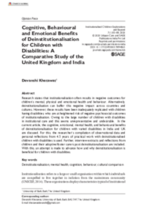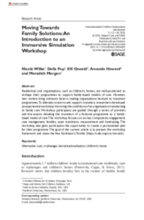Displaying 131 - 140 of 669
In the current article, the cognitive, emotional, mental health, and behavioural benefits of deinstitutionalisation for children with varied disabilities in India and UK are discussed.
The goal of the current article is to present this workshop framework and share the free Facilitator’s Toolkit.
This special issue of the Institutionalised Children Explorations and Beyond journal, guest-edited by Delia Pop, Tessa Boudrie and Mark Riley of Hope and Homes for Children, focuses on deinstitutionalization in South Asia.
Based on the information gathered throughout the course of the Opening Doors for Europe’s Children campaign, this final report first reflects on: (1) the rationale for the campaign and how it operated; (2) the progress towards child protection system reform across campaign countries as well as the developments at the EU level; and (3) the lessons learnt from the campaign and some final recommendations to the European Union.
This Internal Mid Term Review (MTR) was conducted after completion of Year 1 of a pilot project to create a replicable model for child care institutions (CCIs) to effectively implement Family Based & Alternative Care in India.
The aim of this report was to collate information about policies and plans, changes over time, strengths and areas of concerns relevant to advancement in deinstitutionalisation in 27 EU countries and for six target groups: adults with disabilities, adults with mental health problems, children (including children with disabilities), unaccompanied or separated migrant children, homeless persons and older adults.
This chapter traces and explains responses to deinstitutionalisation reforms in the Russian regions. Three parallel policy shifts are taken into account: deinstitutionalisation (DI), public sector reform, and social provision reform.
In this chapter of Reforming Child Welfare in the Post-Soviet Space, the authors analyse how children in foster care in Russia perceive their experiences in foster families through the use of biographies.
This study seeks to map the landscape of support for transitioning residential care centers, specifically considering organizations or individuals who are providing or could provide assistance through on-the-ground, individualized coaching or technical support.
This study adopted a phenomenological research design, purposively sampling 26 preteens and teenagers living, during the school term, in a Charitable Children's Institution (CCI) that doubles up as their School and then moving to live with foster families during the school holidays. The focal areas of the field study were the young people's experiences in the CCI, the transition to the foster families, and the young people's experiences in foster care.







